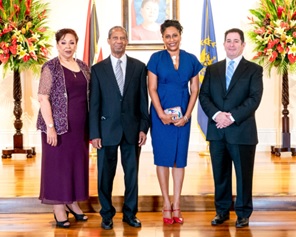Professor Christine Carrington:

Prof. Christine Carrington is a professor of Molecular Genetics and the current departmental head of Preclinical Sciences at the University of the West Indies, St. Augustine, Trinidad. With an educational background in Biotechnology (BSc.) and Molecular Virology (PhD.) from the University of London, King’s College and the Institute of Cancer Research respectively, Prof. Carrington has been involved in disease research since 1990. Her primary interest is understanding the evolutionary and ecological factors that are involved in the emergence, spread and maintenance of viruses, especially RNA viruses such as zika, chikungunya, dengue, yellow fever, rabies virus and SARS-CoV-2. Prof. Carrington has over 80 scientific publications and has been cited more than 2900 times. As the Board of Governor representative for Trinidad and Tobago, Prof. Carrington’s functions include determining the general policies and principles governing the activities of the Centre, admitting new members to the Centre, approving the work programme and budget, taking into account the recommendations of the Council of Scientific Advisers, adopting the financial regulations of the Centre and deciding on any other financial matters. Additionally, on a local level, she is responsible for advising on matters relating to ICGEB opportunities for T&T nationals, including leading the panel of experts for review and endorsement of applications submitted.
In 2015, Prof. Carrington was a recipient of the ICGEB Meeting and Courses Award which provided funding for the organisation of the 20th International Bioinformatics Workshop on Virus Evolution and Molecular Epidemiology (VEME) from August 9th- 14th, 2015, at the St. Augustine Campus of the University of the West Indies (UWI). The workshop provided virologists and bioinformaticians with intensive training in mathematical principles and computer applications used in the study of virus evolution and for conducting detailed molecular epidemiological investigations. Among the nine Trinidad and Tobago nationals trained were four from UWI and one from CARPHA who went on to be directly and heavily involved in SARS-CoV-2 diagnostics and genomic surveillance. They are the people in the lab doing the diagnostic and genome sequencing work that allows Trinidad and Tobago and other Caribbean islands to identify and track SARS-CoV-2 variants of concern. The required local capacity for genome sequencing was implemented in December 2020 through a research project that was conceived and led by Professor Carrington. At the time Professor Carrington stated that the research would enhance [the Caribbean’s] capacity to identify different lineages of the virus, monitor mutations in order to track the virus’ spread, distinguish between local and newly imported cases, as well as to better understand the virus and the immune system’s response to it. Professor Carrington’s team carried out genomic surveillance for the Trinidad and Tobago Ministry of Health and did the same for 16 other CARPHA member states until CARPHA developed their own in-house capacity in December 2021.

Her work on COVID-19 has not gone unrecognized as she was awarded the 2022 Anthony N Sabga Caribbean Award for excellence in Science and Technology and a Trinidad and Tobago National Award (Chaconia Gold Medal) for her contribution in the field of Molecular Genetics and Virology. Professor Carrington has many other notable awards and accolades under belt, such as the UWI Research Award for Outstanding Research Mentorship in 2012, the UWI’s “60 under 60” leader in academics in 2008 and the Commonwealth Research Fellowship in 2004.
 868-662-2002 ext. 83109
868-662-2002 ext. 83109  christine.carrington@sta.uwi.edu
christine.carrington@sta.uwi.edu - Research Gate: Christine CARRINGTON | Professor (Full) | BSc, PhD | University of the West Indies, St. Augustine | UWI | Department of Pre-Clinical Sciences (researchgate.net)
- Google Scholar: Christine Carrington - Google Scholar
- The University of the West Indies Profiles: Professor Christine Carrington | Tropical Medicine Cluster: Infectious Diseases (uwi.edu)



